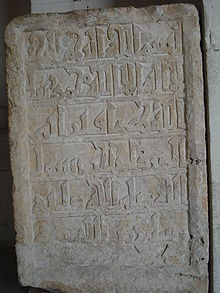Abū d-Dardā '
Abū d-Dardā ' ( Arabic أبو الدرداء, DMG Abū d-Dardāʾ , died around 652 ) was a younger contemporary and companion of the Prophet Mohammed . His name and his origin are passed down differently, one finds ʿUwaimir b. Zayd or ʿĀmir b. ʿAbdallāh or Mālik or Thaʿlaba. He belonged to the Banu Khazradsch tribe in Medina .
After the Battle of Badr , he converted to Islam ; According to some sources, he is said to have also participated in the Battle of Uhud . When Mohammed established brotherhoods between the emigrants and the residents of Medina , Abu Darda was chosen as "brother" by Salmān al-Fārisī . Some hadiths are ascribed to him, some Sufis count him among the Ahl as-Suffa . Before accepting Islam he was a trader, but after converting he gave up trading because, in his opinion, he could not be combined with the practice of cultic obligations . As an expert on the Koran , however, he enjoyed a high reputation; a few different readings of the Koran can be traced back to him . He was sent to Damascus as a judge , where he was the founder of the school there as a Koran teacher, which was later headed by Ibn Amir (d. 736). He died around 652 in or near Damascus, at the time of the caliphate of ʿUthmān ibn ʿAffān . His grave and that of his wife Umm ad-Darda 'are preserved next to one of the old town gates.
literature
- Arthur Jeffery : Abū l-Dardā ' in: Encyclopaedia of Islam , 2nd Edition, Vol. 1, p. 113.
Web links
- Susanne Wilms in: Islamische Zeitung , September 28, 2010
| personal data | |
|---|---|
| SURNAME | Abu Darda |
| ALTERNATIVE NAMES | Abū d-Dardā |
| BRIEF DESCRIPTION | Prophet Companion of Muhammad |
| DATE OF BIRTH | 6th century or 7th century |
| PLACE OF BIRTH | Medina |
| DATE OF DEATH | 7th century |
